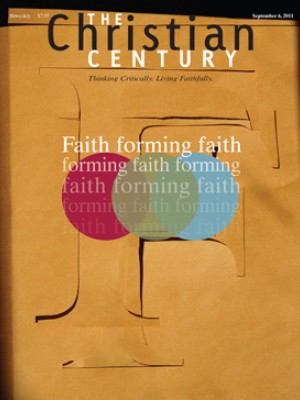Sunday, September 11, 2011: Exodus 14:19-31
This year the lectionary texts will be heard on the tenth anniversary of 9/11. It will be hard for many preachers and congregants to hear this pivotal scripture from Exodus above the rat-a-tat-tat rhetoric of partisanship and triumphalism that still grips our culture at the end of the first post-9/11 decade.
In contrast, I remember the first Sunday after 9/11, a deeply painful day when churches everywhere were filled to capacity with brokenhearted people grieving and praying and hoping for a faithful word from brokenhearted preachers. But that season of crisis and public mourning was brief, and strong cultural forces were soon at work coaxing the national mood out of its rhythm of lament.
Read our latest issue or browse back issues.
Over time, many churches took their cue from the surrounding culture and slipped into a season of vengeance that has been hard to shake. The dangerous temptation as we revisit the horrifying memories—especially with the still fresh news of the capture and assassination of Osama bin Laden on our minds—is to identify ourselves too easily with the Israelites who pass unharmed through the Red Sea while their pursuers, the Egyptians, are drowned. "Horse and rider [God] has thrown into the sea" will be heard by some this year with a smug and premature literalism. It will be a shame if we interpret this text of deliverance through a lens that's far more exclusive than God's lens.
Amid the images delivered up by this text, the one that most captures me this year is the pillar of fire and cloud. Can this image help us plumb a truth that comes with the gift of ten years' time? We will remember the pillar of fire and cloud that billowed out of the World Trade Center and up into a blue September sky. But it may be harder to recall that beneath it all, in the streets of New York, it was not the pursuing enemy that was running in panic; it was us. Everything we thought we knew about living in this world—our way of life, our place in the catbird seat, our sense of power, the truth of our causes—was running in panic, and still is. On that day it was our enemies, not us, who were singing and dancing for joy.
In Exodus, the pillar of fire and cloud separated enemies. There's something powerful in that. "It came between the army of Egypt and the army of Israel. And so the cloud was there with the darkness, and it lit up the night; one did not come near the other all night" (Exod. 14:20). Wrapped up in this story is everything we ever need to know—as well as everything we most certainly will never know—about the judging and redeeming drama of God's presence in our midst. Dwelling up there within the utter mystery of the fire and the cloud that separates Israelites from Egyptians is an unpredictable God—not a God who is endlessly biased toward one people at the expense of another, but a God who is steadfastly preoccupied with a gracious horizon that we cannot comprehend. God is, quite simply, bigger than us and our agendas.
What is truly baffling about God is that the pillar of fire and cloud not only separates enemies but ultimately connects them.
A few months ago I read an amazing story. Through an unlikely series of coincidences, a retired American pilot named Dan Cherry found the F-4 Phantom fighter jet that he had piloted decades ago when he served two tours of duty in Southeast Asia; it was sitting junked and neglected in a thicket of weeds outside a VFW club somewhere in the Midwest. The sight of the plane took him back to April 1972. In a dogfight with a North Vietnamese Russian-made MiG-21, he fired a heat-seeking rocket that blew the wing off of the enemy plane. Cherry recalled seeing the plane's pilot with his arms broken, ejecting himself from the plane and parachuting to the ground 30 miles outside of Hanoi.
Years later, the memory launched Cherry on a search for the North Vietnamese pilot, and in 2008 Cherry found him in Ho Chi Minh City. "Welcome to my country," Nguyen Hong My said. "Glad to see you are in good health. I hope we can be friends." Cherry went to the man's home for dinner, met his family and held his one-year-old grandson. Later Hong My returned the favor and visited Cherry in the United States. Dying to their old selves, two former enemies were reborn as friends.
In a sermon published in Journal for Preachers, Albert C. Winn told an old Hasidic tale. According to a rabbi, the angels were rejoicing over the deliverance of Israel at the Red Sea—playing their harps, singing and dancing. "Wait," said one of them. "Look, the Creator of the Universe is sitting there weeping!" They approached God and asked, "Why are you weeping when Israel has been delivered by your power?" "I am weeping," said the Maker of the Universe, "for the dead Egyptians washed up on the shore—somebody's sons, somebody's husbands, somebody's fathers" ("A Way Out of No Way: Exodus 14:5–31").
It is time for us to preach this text from the vast and gracious perspective of One who—way up there in the midst of fire and cloud—is not rejoicing at anyone's victory but instead weeping at everyone's loss. Maybe those tears help form that sustaining cloud of deliverance and purpose—a cloud that not only separates enemies but also connects them.






